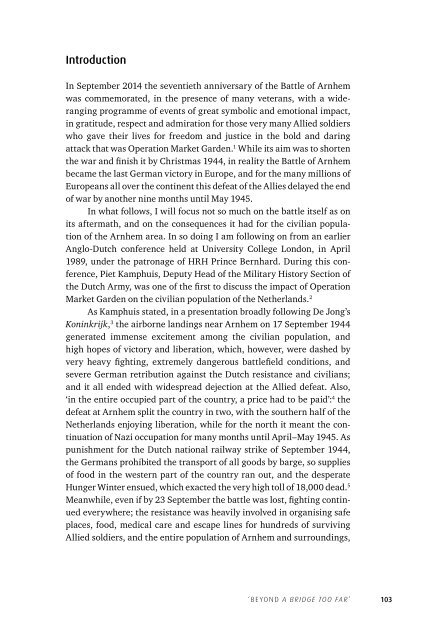Discord Consensus
7aze300jFJo
7aze300jFJo
You also want an ePaper? Increase the reach of your titles
YUMPU automatically turns print PDFs into web optimized ePapers that Google loves.
Introduction<br />
In September 2014 the seventieth anniversary of the Battle of Arnhem<br />
was commemorated, in the presence of many veterans, with a wide-<br />
ranging programme of events of great symbolic and emotional impact,<br />
in gratitude, respect and admiration for those very many Allied soldiers<br />
who gave their lives for freedom and justice in the bold and daring<br />
attack that was Operation Market Garden. 1 While its aim was to shorten<br />
the war and finish it by Christmas 1944, in reality the Battle of Arnhem<br />
became the last German victory in Europe, and for the many millions of<br />
Europeans all over the continent this defeat of the Allies delayed the end<br />
of war by another nine months until May 1945.<br />
In what follows, I will focus not so much on the battle itself as on<br />
its aftermath, and on the consequences it had for the civilian population<br />
of the Arnhem area. In so doing I am following on from an earlier<br />
Anglo-Dutch conference held at University College London, in April<br />
1989, under the patronage of HRH Prince Bernhard. During this conference,<br />
Piet Kamphuis, Deputy Head of the Military History Section of<br />
the Dutch Army, was one of the first to discuss the impact of Operation<br />
Market Garden on the civilian population of the Netherlands. 2<br />
As Kamphuis stated, in a presentation broadly following De Jong’s<br />
Koninkrijk, 3 the airborne landings near Arnhem on 17 September 1944<br />
generated immense excitement among the civilian population, and<br />
high hopes of victory and liberation, which, however, were dashed by<br />
very heavy fighting, extremely dangerous battlefield conditions, and<br />
severe German retribution against the Dutch resistance and civilians;<br />
and it all ended with widespread dejection at the Allied defeat. Also,<br />
‘in the entire occupied part of the country, a price had to be paid’: 4 the<br />
defeat at Arnhem split the country in two, with the southern half of the<br />
Netherlands enjoying liberation, while for the north it meant the continuation<br />
of Nazi occupation for many months until April–May 1945. As<br />
punishment for the Dutch national railway strike of September 1944,<br />
the Germans prohibited the transport of all goods by barge, so supplies<br />
of food in the western part of the country ran out, and the desperate<br />
Hunger Winter ensued, which exacted the very high toll of 18,000 dead. 5<br />
Meanwhile, even if by 23 September the battle was lost, fighting continued<br />
everywhere; the resistance was heavily involved in organising safe<br />
places, food, medical care and escape lines for hundreds of surviving<br />
Allied soldiers, and the entire population of Arnhem and surroundings,<br />
‘BEYOND A BRIDGE TOO FAR’<br />
103


